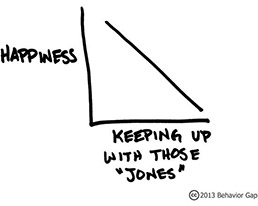Subscriber Benefit
As a subscriber you can listen to articles at work, in the car, or while you work out. Subscribe Now
 My friend Carl Richards is a financial planner, creator of The New York Times’ “Sketch Guy” column, and author of “The Behavior Gap: Simple Ways to Stop Doing Dumb Things with Money.”
My friend Carl Richards is a financial planner, creator of The New York Times’ “Sketch Guy” column, and author of “The Behavior Gap: Simple Ways to Stop Doing Dumb Things with Money.”
Richards wrote of behavioral studies uncovering some interesting hidden human biases. He said failure to acknowledge and overcome these biases can have a disastrous effect on our financial health. He was kind enough to allow me to share his thoughts and sketch with you.
If your employer offered to double your salary, would you jump at the chance? In a rational world, you’d take that deal 100 times out of 100. However, you’ll probably be surprised to learn how we make a “no brainer” decision like this depends on whether someone else is involved.
Economists generally assume “utility” is a function of an individual’s “endowment.” In other words, more of a good is better, independent of the individual’s relative position. However, these studies showed people do not act independently of relative position, which can have a powerful and dangerous behavioral influence.
In 1995, 257 faculty, students and staff at the Harvard School of Public Health responded to a survey containing 12 questions, each containing two states of the world. In each state, respondents were told how much of a good they had and how much others had.
 (Graphic courtesy of Carl Richards)
(Graphic courtesy of Carl Richards)Amounts of good were structured so that in the “positional” state, the respondent had more of the good than others. In the “absolute” state, amounts of the good for both the respondent and others were greater than in the positional state, but respondents had less of the good than others.
Researchers asked respondents which of two worlds they would prefer to live in: State A (“Positional”), earning $50,000 per year while others earn $25,000, or State B (“Absolute”), earning $100,000 per year while others earn $200,000?
Who wouldn’t want to earn twice as much? As it turns out, about half the respondents preferred earning 50 percent less, as long as their relative position was high.
There is a reason envy is one of the Seven Deadly Sins. As Richards says, we struggle with relative comparisons and money.
“Instead of focusing on what’s in our best interest,” he wrote, “we compare ourselves with others and act accordingly.” We don’t measure our decisions against our goals; we measure them against what we see around us.
The problem of being on this “positional treadmill” is that the goal line is always moving. Richards asks, “How close can we possibly get to our goals if we’re constantly chasing someone else’s?” Make sure your investment choices move you closer to your goals.
If you can apply that filter, it doesn’t matter what the Joneses are doing. You’ll be better off.•
__________
Kim is the chief operating officer and chief compliance officer for Kirr Marbach & Co. LLC, an investment adviser based in Columbus, Ind. He can be reached at (812) 376-9444 or [email protected].
Please enable JavaScript to view this content.
